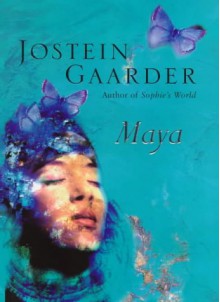310pages. 23,4x16x3,6cm. Relié. Jostein Gaarder is not one to shirk at the larger questions: who are we? and where does the world come from? In his latest novel, Maya, he once again addresses life, the universe and pretty much everything else, concentrating on the existence of God, the evolution...
show more
310pages. 23,4x16x3,6cm. Relié. Jostein Gaarder is not one to shirk at the larger questions: who are we? and where does the world come from? In his latest novel, Maya, he once again addresses life, the universe and pretty much everything else, concentrating on the existence of God, the evolution of life as we know it, the nature of consciousness and the meaning behind it all. It's weighty stuff for a mere 300 or so pages of prose, and Gaarder is not entirely successful in dealing with these issues in a readable manner. The novel is set in Madrid and on the unspoiled Fijian island of Taveuini. Frank Andersen, a Norwegian evolutionary biologist who feels "oppressed by the grief that the lack of spirit and permanence in our existence brings", meets up with a beautiful Spanish Flamenco dancer, Ana, her companion Jose, and an English writer from Croydon, John Spoke. They then discuss the big issues. This is where the problem arises; there is too much discussion of ideas and not enough emotional involvement or development of characters. They exist merely as mouthpieces for different theories. Gaarder then adds a bewildering supernatural dimension. There is Ana and Jose's manifesto, a mystical dialogue that describes the creation and evolution process in a series of self-consciously obscure metaphors to consider; hints of past lives; a time-travelling dwarf; and an enigmatic photograph. All this excitement sits uneasily with the almost pedantic prose style. Gaarder's forte is to incorporate challenging themes into a flowing, imaginative narrative. The author's earlier novel,Sophie's World, has been a phenomenal success; the novel has sold over 16 million copies, been translated into 42 languages and is a whistle-stop tour of philosophy, from Socrates to Sartre. Unfortunately in the case of Maya, the story fails to grip the reader enough and lacks the fluidi...
show less

